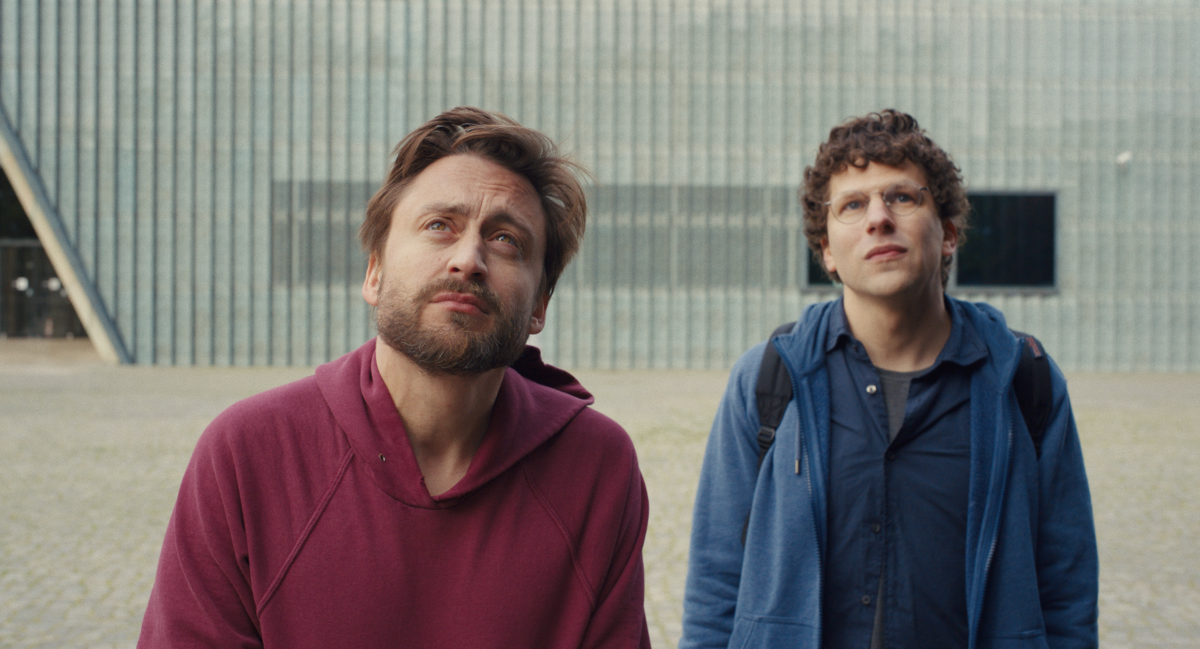
Jesse Eisenberg tends to play characters that are repressed, neurotic, dutiful. Kieran Culkin tends to play characters that are loud, irreverent, inappropriate.
So it was a rather genius move for Eisenberg to cast himself against Culkin in the film he wrote and directed, A Real Pain. They are an “odd couple” to be sure, but while Neil Simon’s play was mostly a vehicle for laughs—the slob and the neatnik living together—Eisenberg is reflecting on no less than how humans process grief and come to terms with global atrocities.
Eisenberg’s David and Culkin’s Benji are first cousins who were once best of friends but have since drifted apart. This is largely because David has moved to Manhattan, with a wife and a mop-headed toddler son and a normie job (he sells banner ads on websites). Meanwhile, Benji is a bit adrift. He still lives in the basement of his childhood home, in Binghamton, NY. And he’s still reeling from the death of his grandmother, his “favorite person in the world.”
It’s the death of their grandmother that compels the cousins to travel to Poland, to see the home where she grew up before she escaped the Nazis. They also will pay a visit to the nearby Majdanek concentration camp, where millions of others didn’t benefit from “a series of tiny miracles” to survive. They join a tour group of mostly well-heeled Jewish people, led by the earnest and knowledgeable James (White Lotus’ Will Sharpe). In the group: a retired married couple (Daniel Oreskes and Liza Sadovy); a recent divorcee named Marcia (Jennifer Grey) seeking meaning in her life; and Eloge (Kurt Egyiawan), a survivor of the Rwandan genocide who converted to Judaism.
“Oh snap!” exclaims Benji when he finds out that Eloge is a genocide survivor. Everyone stares at him, but this is what Benji does—he expresses his feelings, loudly and without a filter. David finds himself apologizing for his cousin throughout the trip, but something curious happens—Benji’s brutal honesty and outsized emotions have a way of loosening the tour group up and bringing them to some greater truth. Marcia starts confiding in him. Eloge and Benji become real friends.
At one point, the tour visits a statue of Polish soldiers during the Warsaw Uprising. Benji wants to take a photo with the statue, pantomiming himself in battle. “That’s inappropriate,” David stutters, but Benji plows ahead, and soon everyone is joining him—all playing various roles (Eloge is a medic, using his scarf as a torniquet).
Next, at a Jewish graveyard, Benji tells tour guide James he’s talking too much. Just let them feel.
James is affronted and, again, David apologizes for his cousin’s rudeness, but later, James realizes that Benji was right about that—and about the fact that they should spend more time among actual Polish people—and he thanks him.
When the group finally arrives at Majdanek, they all do the solemn thing we do on such tours—walk slowly, hands behind their backs, their faces silently registering the shock. On the train ride back to the hotel, however, Benji is the only one who openly weeps.
Both Eisenberg and Culkin are playing variations of their well-worn personas, but neither has ever been better. Eisenberg’s David is so heartbreakingly familiar, a kind and fastidious man who has learned how to manage his fears and neuroses, but they’re always burbling just under the surface. And Culkin is a sheer life force as Benji—a human truth bomb, all id, no filter, equal parts charming and unsettling.
It’s clear that Benji feels too much, is honest to a fault, takes up too much space. He would be exhausting to be around, a “real pain.” But Eisenberg is also suggesting that our ability to compartmentalize grief, to take in the horrors of the world without being leveled by them is not always a good thing. And thus we get the double entendre of the title: Sometimes it’s important to sit with that real pain.
